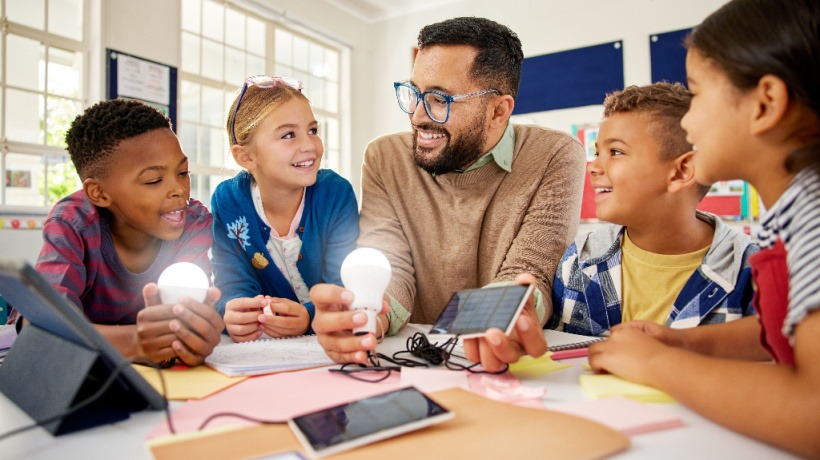What Can A Pandemic Teach Us About Climate Crisis?
Would you believe that the pandemic can save the world from climate change? No seriously! There have been many good things to come out of the pandemic and managing a climate crisis may be the most beneficial indirect outcome.
The benefits, however, can only be realized if corporate stakeholders, government leaders, and society as a whole, learn from the positive elements coming out of the pandemic. The operative word is "learn." This requires those responsible for learning (aka learning practitioners like yourself) to embrace the crucial role to help them discover and apply this newfound knowledge.
It's safe to say we've collectively experienced an unusual and unprecedented couple of years (and will continue for the foreseeable future). I've stated repeatedly, whenever our species faces significant tragedy or change, we always come out of it stronger and better. If not, we would already be extinct.
This pandemic is no different from any other catastrophic event our species has faced. Yes, we all wish it didn't happen, but it did. Now, the worldwide human collective will hopefully shake off the shackles of past complacency and become more innovative and motivated. Learning from this event is key because it will probably happen again. The question is: Will we actually apply what we've learned? Let's hope so, otherwise we'll certainly be extinct the next go-around.
Here's the thing: The pandemic will pass. Collectively, we're really good at taking action regarding things that happen quickly and suddenly. It's the slower catastrophes we tend to procrastinate on, like the avoidance and mishandling of climate change. Then it came to me; this is where the pandemic and climate crisis intersect. If we're smart about it, we will apply what we've learned during the pandemic and leverage it to address the climate crisis.
How? One thing the pandemic has done is to shake us out of our societal, auto-pilot slumber. If we're honest with ourselves, the pre-pandemic normal everyone desperately wants was not a good normal. We didn't notice how bad it was only because society gradually evolved into it over decades. Many things we did, and still hang on to, were meant for another time and circumstance. For example, the 9-to-5 workweek or commuting to work at a specific location. The pandemic is forcing us to rethink how we function within a society that, if permanently changed, could put a dent in our climate change worries.
Cities No More
Naturally, stating "cities no more" is meant to be provocative, but here's the thing we need to seriously ask ourselves: Why do we have these major hubs (cities) to gather and work? The pandemic made it very clear that cities are irrelevant, mostly because of remote work (see next point).
This raises the question, along with some deep critical thinking and objectivity: Why do we need cities at all? Prior to modern cities, societies worked remotely and mostly for themselves (and often the state). I'm not implying returning to a horrid past, but the concept of modern cities is to congregate people to work in production environments leading to tangible outputs. And then, we scurry away from cities to our suburban homes (some do live in cities but it is becoming less and less). Meeting at a commonplace makes sense only for an industrial age economy, but it doesn't make sense when moving toward a fully functional, low-impact, knowledge-focused, and technologically enabled economy.
The challenge is that governments and companies have vested interests in keeping cities functioning due to hundreds of millions, if not billions, of dollars of infrastructure investment and tax revenue. The problem is that these infrastructure investments were designed when climate change wasn't a thought. Cities are now significant climate change contributors. And these vested interests constrain proposed solutions either because of self-preservation or lack of courage to make any type of substantive changes. Making any substantive changes requires a clean slate.
We probably won't see any change on a massive scale, but note this: There will be subtle changes over time. The pandemic has changed how we work, and should strategic changes actually occur, the positive impact on the climate could be significant. But our society must take immediate steps to rethink the future purpose of cities because as of now it's a climate problem and the pandemic shows we don't need them.
Remote Work And Carbon Footprint
Going on close to two years, most western societies have transitioned to remote work. If you're a knowledge and/or white-collar employee, you've spent considerable time working from home. During this period, we've adapted to a productive decentralized workflow.
Granted, not everyone had the luxury of working from home, such as frontline workers, but most of us did. And for the most part, most of us liked it. Consider what you didn't have to do like commuting in your car, commuting using public transit, purchasing clothes, purchasing personal and beauty care products, along with so much more.
Remote work probably not only saved you a whole pile of money but also significantly limited your carbon emissions. Now you may say, "But I'm only one person! How much impact can I have?" Agreed, alone you're insignificant but consider hundreds of millions of people doing the same. It quickly adds up.
Remote work is fundamental to rethinking how we work, where we work, and what we work on. It contributes to a more balanced work-life. According to FlexJobs’ 2019 Annual Survey, 78% of people said having a flexible job would allow them to be healthier and 86% said they would be less stressed (ref: Working remotely: It does the environment, body, and business good, CPA Canada).
Resulting from pandemic-initiated changing work habits, it appears global greenhouse gas emissions dropped by approximately 2.4 billion tons in 2020, a 7% drop from 2019 and the largest decline on record (according to research from the University of East Anglia, the University of Exeter, and the Global Carbon Project).
Furthermore, Global Workplace Analytics reports that continuing part-time remote work can reduce carbon emissions by more than 51 million metric tons annually. The pandemic has forced us to reduce office energy use, business travel, and paper usage, all of which will see a reduction in production emissions as well. Additionally, there was a dip in idling traffic which resulted in a temporary drop in emitted greenhouse gases.
What Can You Do?
Your role as a learning practitioner is increasingly relevant. You are the knowledge gatekeeper and must harness your role to equip your organization with the skills to adapt to a new, unpredictable, and continually evolving reality.
Your responsibilities are twofold. First, proactively supporting your stakeholders in their need to learn what they must do to adapt, not only to a post-pandemic reality but to also foster an environmentally responsible organizational image. They may not show it but your stakeholders desperately require any relevant learning that will help address employee needs and mitigate uncontrollable issues within an uncertain environment. They are under pressure to ensure organizational success while managing things like pandemic uncertainty and meeting environmental expectations.
Your second responsibility is to proactively support employee development requirements within a new remote work context. This means helping to maintain performance and productivity levels within uncertainty by providing timely, relevant, and well-integrated learning resources. This is not the old-school training employees and stakeholders tolerated in the past. That's long gone. And if you're still doing it, you'll be long gone. You must innovate by developing dynamic and adaptive blended learning opportunities.
This is truly your time to step up and shine. You have the expertise. It's time to leverage the technology, tools, and creativity. Doing so will help your organization succeed in turbulent times and also show that your contribution to a new future will make the world a better and healthier place.
Please share your thoughts and feedback with us. We’d enjoy hearing about your efforts. And who knows, it may be the topic of our next eLearning Industry article. Also, please check out our LinkedIn Learning courses to learn more about developing your business credibility for your learning efforts. Please share your thoughts and remember #alwaysbelearning!







